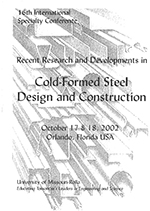Session Dates
17 Oct 2002
Abstract
Design codes recognize the ability of some structures to undergo significant inelastic deformation during a seismic event without reaching the point of collapse. In consideration of this behaviour, building codes provide force modification factors (R-values) to determine the reduced lateral loads that engineers may use in design. This paper presents an overview of the seismic requirements for various design standards and an explanation of how R-values may be determined from test results. The findings of an evaluation of existing steel stud shear wall test data, in addition to preliminary force modification factors for use in seismic design, are presented.
Department(s)
Civil, Architectural and Environmental Engineering
Research Center/Lab(s)
Wei-Wen Yu Center for Cold-Formed Steel Structures
Meeting Name
16th International Specialty Conference on Cold-Formed Steel Structures
Publisher
University of Missouri--Rolla
Document Version
Final Version
Rights
© 2002 University of Missouri--Rolla, All rights reserved.
Document Type
Article - Conference proceedings
File Type
text
Language
English
Recommended Citation
Zhao, Y. and Rogers, Colin A., "Preliminary R-values for Seismic Design of Steel Stud Shear Walls" (2002). CCFSS Proceedings of International Specialty Conference on Cold-Formed Steel Structures (1971 - 2018). 4.
https://scholarsmine.mst.edu/isccss/16iccfss/16iccfss-session7/4
Preliminary R-values for Seismic Design of Steel Stud Shear Walls
Design codes recognize the ability of some structures to undergo significant inelastic deformation during a seismic event without reaching the point of collapse. In consideration of this behaviour, building codes provide force modification factors (R-values) to determine the reduced lateral loads that engineers may use in design. This paper presents an overview of the seismic requirements for various design standards and an explanation of how R-values may be determined from test results. The findings of an evaluation of existing steel stud shear wall test data, in addition to preliminary force modification factors for use in seismic design, are presented.



